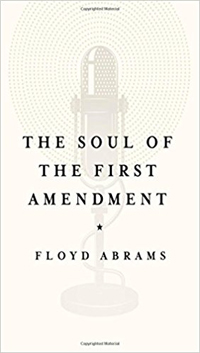 Floyd Abrams, The Soul of the First Amendment (New Haven: Yale, 2017), 145pp.
Floyd Abrams, The Soul of the First Amendment (New Haven: Yale, 2017), 145pp.
Floyd Abrams didn't write the First Amendment, says Alan Dershowitz in his book cover blurb, but few legal scholars have done more to defend, explain, and protect it than Abrams. There was significant debate at the Constitutional Convention whether even to have any bill of rights, and today, says Abrams, the First Amendment is the "most honored and least understood" addendum to the US Constitution. It's only forty-five words, and includes freedom of religion, the right to peaceably assemble, and the right to petition the government "for a redress of grievances." Abrams focuses on the nine words that prohibit the government from "abridging the freedom of speech or of the press." In particular, he shows how other robust democracies like England and Canada, in cases regarding hate speech and the right to be forgotten, restrict freedoms of speech in ways that are unthinkable here in the United States.
Abrams represented the New York Times in the case of the Pentagon Papers, and Mitch McConnell before the Supreme Court in Citizens United. He is unfailingly fair-minded and especially helpful in exploring the controversial and conflicting interests of matters like national security in cases like Wikileaks and Edward Snowden. There's virtually no important free speech issue that he has not thought long and hard about — the right to be forgotten, unlimited spending by corporations in elections, privacy rights, hate speech and defamatory statements, abortion demonstrations, obscenity laws, burning the flag, and saluting the flag. That the First Amendment intends to place strict limits on the government's authority over religion, speech, and the press is clear, but in the last sentence of the book, that still leaves the public with a thorny question: "What to print? The First Amendment provides no answer to this question. It never does." That's for citizens to decide, and sometimes that's a complicated and controversial matter.


